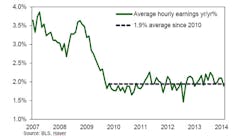Although wages are growing at a near zero level on average for most civilian workers, wage pressures are beginning to mount in manufacturing and information technology, according to the Bureau of Labor Statistics. At the same time, some businesses report growing pressure from employee costs when health and retirement benefits are included, raising total worker compensation and in some cases deterring hiring plans.
According to the latest Fed Beige Book, released April 16th, most Districts reported wage pressures were, “contained or minimal." However several districts noted increases in wages for certain occupations and in certain areas where specific skills are in high demand and under supplied. In New York, Richmond, and Chicago, employers cited a low supply of laborers in the IT field, while Kansas City cited labor shortages for skilled positions in manufacturing and trade.
Employers in the Dallas area also reported skilled manufacturing labor in short supply. While an ample supply of labor usually translates into numerous applicants for each vacancy, many employers are having difficulty finding potential employees with a particular skillset to fulfill the job requirements and are willing to increase pay for those that do hold those desired skills.
In areas where labor – and the required skills – is in ample supply, wage pressures remain contained in general, but some companies are seeing compensation inflation thanks to rising health and benefit expenses pushing up total "employee related" costs. According to the Employee Cost Index, employee benefit costs have been growing on average 2.5% over the past three years, outpacing the average 1.6% growth rate in wages and salaries.
Most employers attribute the rising benefits costs to the Affordable Care Act, which now requires employers to provide
more employees with inclusive health plans because of Obamacare regulations and mandates for minimum essential health benefits. Businesses from asset-management to manufacturing to the food and beverage industry have reported expectations of rising “people-related costs." One large soda retailer announced that these mounting costs are expected to total more than $30 million for the current year, all led by higher health related expenses. For many businesses, big and small alike, these rising costs and expectations of further increases have slowed near-term hiring and hiring plans over the coming years. Twenty percent of US companies are wary of taking on new, full-time employees as a result of the Affordable Care Act, and more than 40% of businesses reported that they would only consider part-time employment in the near term (according to the findings from Duke University/CFO Magazine's Global Business Outlook Survey).
Lindsey Piegza is chief economist at Sterne Agee.




